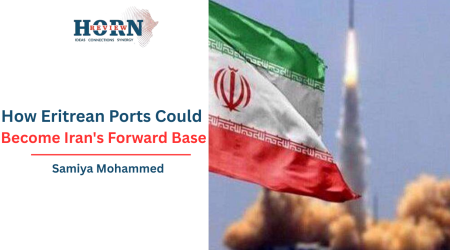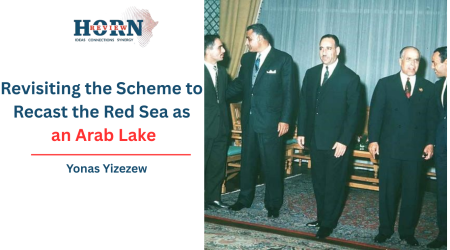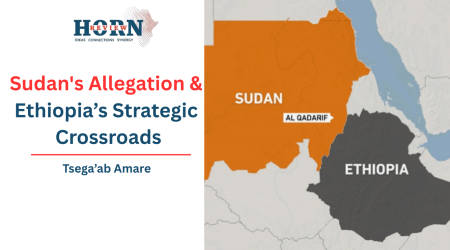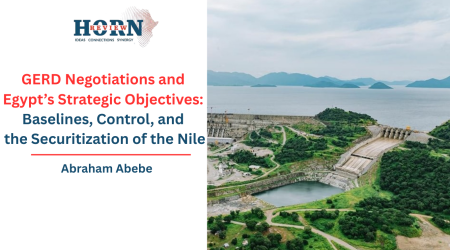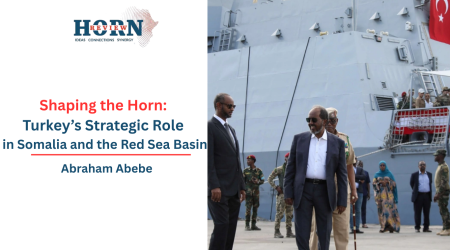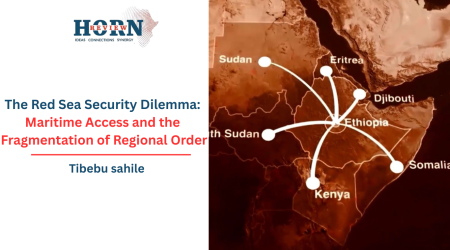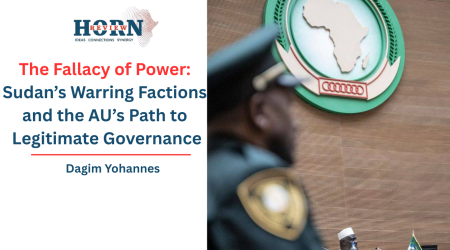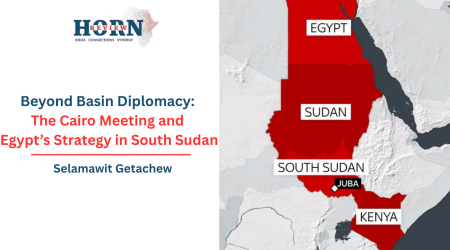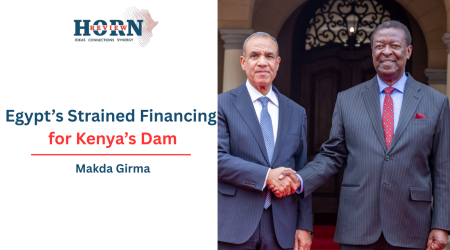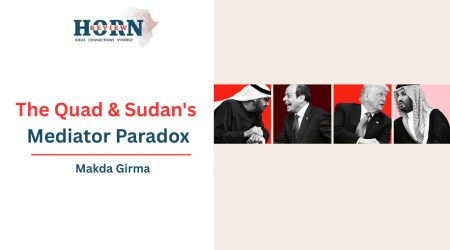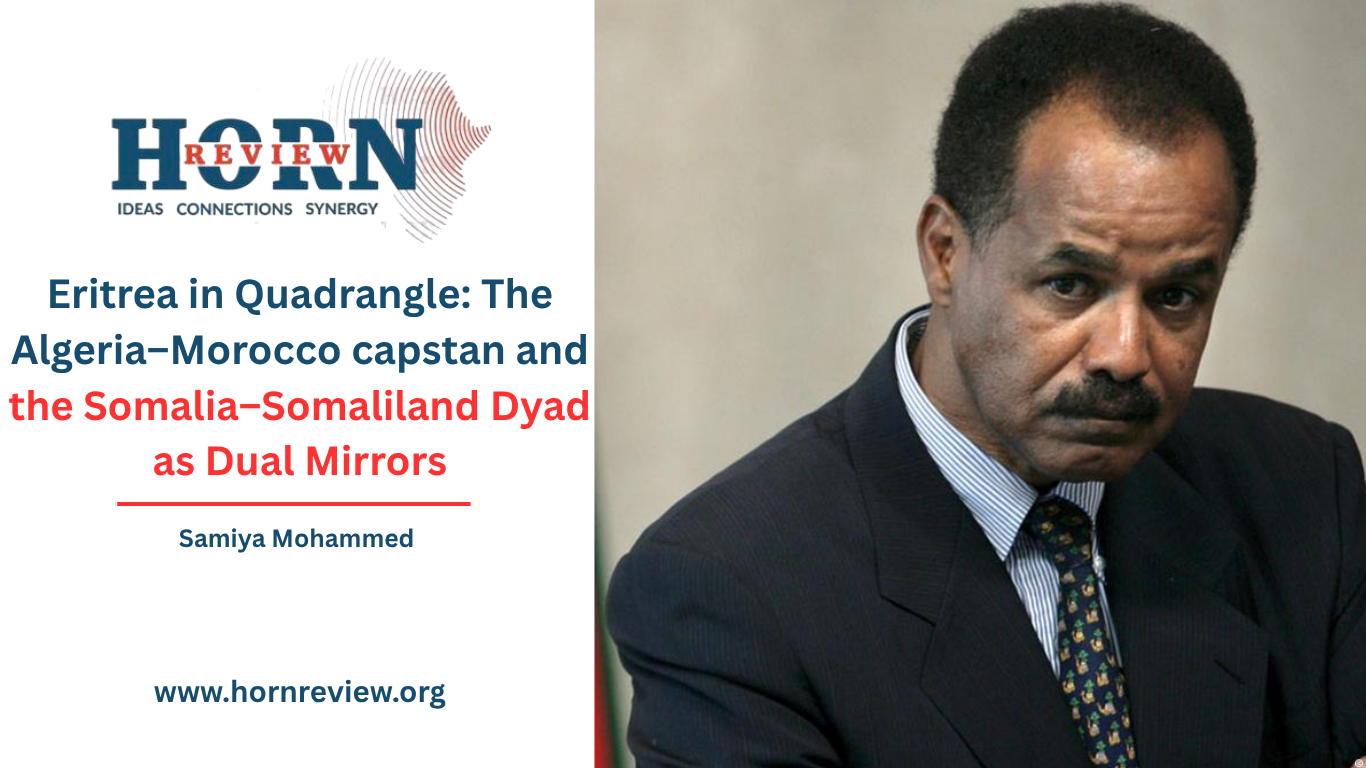
20
Nov
Eritrea in Quadrangle: The Algeria–Morocco capstan and the Somalia–Somaliland Dyad as Dual Mirrors
The current prospect of the Horn of Africa is defined by the Isaias Doctrine which is a security gauge in which the Eritrean government consciously predicates its own stability and survival on actively fostering instability, fragmentation, and exclusion within Ethiopia. This doctrine is an intended strategy of sustained confrontation, maintaining a no-peace, no-war status that serves its interests. The brief 2018 rapprochement proved to be a tactical interlude rather than a genuine shift, as the core tenets of the doctrine remained unchanged.
The Isaias Doctrine is the product of a deliberate and consistent foreign policy ambit established by the Eritrean government. This worldview is not a passive reaction but an active choice to define Eritrea’s security in zero-sum terms against its neighbour. The central tension is fueled by Ethiopia’s legitimate and stated objective of securing Red Sea access, an imperative for large population. The Eritrean government, however systematically bods this objective as a threat, regardless of the proposed modality. Asmara’s posture interprets any enhancement of Ethiopian economic or strategic capacity whether through direct negotiation, partnership with Somaliland, or engagement with Sudan as an inherent challenge to its own sovereignty. This reflexive opposition is a bedrock of its doctrine.
The cautious and somewhat dicey partnership between Algeria and Morocco offers a revealing lens through which to understand Eritrea’s alliance patterns. Much like Morocco views Algeria’s involvement in Saharan affairs with caution, fearing overreach despite their cooperation against common foes, Eritrea builds selective alliances while maintaining strategic distance. This dynamic exemplifies what might be termed alliance coliseum, expedient partnerships characterized by underlying distrust and divergent ultimate objectives.
Eritrea has recently strengthened ties with Egypt, a nation with its own strained relations with Ethiopia over the Grand Ethiopian Renaissance Dam and Nile water rights, issuing joint statements asserting that Red Sea security must remain the domain of coastal states. Eritrea’s rhetorical positioning within these alliances mirrors Morocco’s approach to the Western Sahara conflict, portraying itself as the status quo power defending against expansionist ambitions. When Ethiopian officials recently accused Eritrea of destabilization activities, Eritrean Information Minister dismissed the rhetoric as too crass and pathetic to sell. This defensive victimhood narrative positioning Eritrea as the vulnerable party confronting a larger neighbour serves to deflect scrutiny from Asmara’s own provocative actions.
Eritrea’s alliance behaviour reflects a premeditated realism designed to counterbalance Ethiopian influence without ceding strategic autonomy. Similarly, Eritrea’s partnership with Egypt serves immediate security needs regarding the Red Sea and Nile River disputes, but likely stops short of full alignment that might constrain Asmara’s independent manoeuvrability. These relationships function as tools of convenience rather than reflections of deep ideological affinity, characterized by inherent limitations and mutual suspicions that prevent them from evolving into genuine strategic partnerships. This selective alignment allows Eritrea to punch above its weight diplomatically while maintaining the narrative of principled self reliance.
Beyond the Algeria-Morocco parallel, the Somalia-Somaliland dichotomy offers another revealing psychological lens for understanding the Eritrea-Ethiopia dynamic. In this structure, Eritrea resembles contemporary Somalia, a state fiercely committed to the legal fiction of territorial integrity and historical unity, while possessing limited capacity to enforce these claims beyond rhetoric and proxy relationships. Like Mogadishu’s refusal to recognize Somaliland’s independence despite having minimal control over the territory, Asmara insists on strict adherence to the 2002 Eritrea-Ethiopia Boundary Commission ruling that awarded key border areas to Eritrea, while lacking the means to compel Ethiopia’s full compliance with the demarcation.
This position serves as both a nationalist rallying cry domestically and perpetual leverage internationally, allowing Eritrea to frame itself as the victim of larger-power intransigence while avoiding normalization that might diminish its ability to use the border issue as a diplomatic weapon. However Ethiopia increasingly mirrors Somaliland’s bearing, a larger historically dominant entity that has lost effective control over specific territories like the EEBC-awarded border areas and Red Sea access yet continues to function, grow economically, and attract international partnerships despite these limitations.
Ethiopia’s economic expansion and diplomatic engagements including with powers like the UAE, which sees as a viable partner for projecting influence across the Bab el-Mandeb parallels Somaliland’s ability to secure international partnerships despite its contested status.This success generates what might be termed prosperity anxiety in Asmara, fuelling Eritrea’s warnings that an economically strengthening, rearming Ethiopia will inevitably attempt to reclaim what it lost ,not necessarily through full-scale invasion, but through gradual economic and strategic dominance that could render Eritrea’s sovereignty increasingly precarious. This psychological dynamic explains why Eritrea remains obsessed with Ethiopia’s rise despite everything, viewing every strategic move through the prism of anxiety.
By Samiya Mohammed, Researcher, Horn Review

